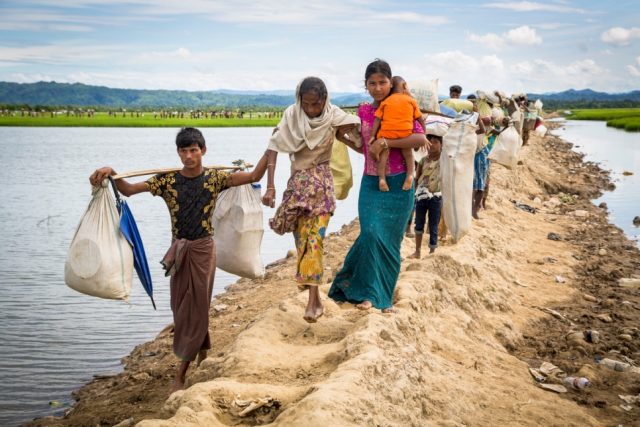UNHCR’s Grandi appeals to Asia-Pacific ministers, business leaders for solidarity with refugees, people of Myanmar’s Rakhine State
07 August 2018


Rohingya families arrive at a UNHCR transit centre near the village of Anjuman Para, Cox’s Bazar, south-east Bangladesh after spending four days stranded at the Myanmar border with some 6,800 refugees. © UNHCR/Roger Arnold
UN High Commissioner for Refugees Filippo Grandi today urged governments and business leaders in the Asia-Pacific to show solidarity with refugees in the region and share responsibility for protecting and finding solutions for them.
Addressing ministers of 26 countries at the Seventh Ministerial Conference of the Bali Process in Bali, Indonesia, Grandi appealed for regional support for over 700,000 Rohingya refugees who have fled to Bangladesh since August 2017, escaping violence and discrimination in Rakhine State, Myanmar.
“I urge you to consider what support your governments could pledge in solidarity with Bangladesh until solutions are found for refugees,” he said. “But we need also to work towards comprehensive solutions for the people of Rakhine State, so that they are not forced to move in the first place.”
The Bali Process is a multilateral forum for 45 governments and four international organizations, including UNHCR, to discuss issues relating to people smuggling, human trafficking, and related transnational crime. In March 2016, the ministers of the Bali Process adopted the Bali Declaration, agreeing on the need for a comprehensive regional approach based on burden-sharing and collective responsibility.
In his address the High Commissioner recalled the “ground-breaking” nature of the 2016 Declaration and urged governments to move from consultation to action on the commitments they made in 2016. Ministers at the Conference agreed to reaffirm those commitments, which include more predictable disembarkation options and cooperating on search and rescue for refugees and migrants in distress, and for root causes to be addressed by resolving statelessness, investing in inclusive development, and expanding safe pathways so that refugees and migrants have legal alternatives to dangerous modes of travel.
Focusing on the Rohingya refugee crisis, the High Commissioner asked member states of the Bali Process to consider how they could help Bangladesh shoulder the responsibility of hosting over 900,000 refugees, including those from previous waves of displacement. He also sought regional support for Myanmar in implementing a Memorandum of Understanding it concluded with UNHCR and UNDP in June to create conditions in Rakhine State conducive to the voluntary and sustainable return of refugees. Such conditions, such as freedom of movement and pathways to citizenship, are not yet in place.
The High Commissioner also addressed business leaders of major corporations who attended the Conference as part of the Bali Process Government and Business Forum, a public-private partnership to expand legal labour migration and combat human trafficking.
“People forced to move can fall prey to modern slavery, adding the insult of exploitation to the injury of exile,” he said. He appealed to the business community to work with governments to provide employment and other economic opportunities to refugees to prevent exploitation and achieve sustainable solutions.
“There are now, more than ever, opportunities for refugees in this region to contribute to their host communities, and for governments and businesses in the region to invest in—and benefit from—resilience in host countries and countries of origin,” Grandi said. “Only through this kind of solidarity, in which each of us does our part, can we ensure that no one in the region is abandoned, at sea or at home, and that no country in the region is abandoned when it opens its doors to those in need.”
The full statement delivered by the High Commissioner at the Ministerial Conference is available here.
For more information on this topic, please contact:
- In Jakarta, Mitra Suryono, [email protected], +62 818 157 962
- In Bangkok, Keane Shum, [email protected], +66 92 275 2585
- In Geneva, Andrej Mahecic, [email protected], +41 79 642 9709
- In Geneva, Charlie Yaxley, [email protected], +41 795 808 702
View this original press release HERE.
၎
င
၎
၎
Announcements
28 February 2025
Asian NGO Network on National Human Rights Institutions , CSO Working Group on Independent National Human Rights Institution (Burma/Myanmar)
Open letter: Removal of the membership of the dis-accredited Myanmar National Human Rights Commission from the Southeast Asia National Human Rights Institution Forum

Progressive Voice is a participatory rights-based policy research and advocacy organization rooted in civil society, that maintains strong networks and relationships with grassroots organizations and community-based organizations throughout Myanmar. It acts as a bridge to the international community and international policymakers by amplifying voices from the ground, and advocating for a rights-based policy narrative.